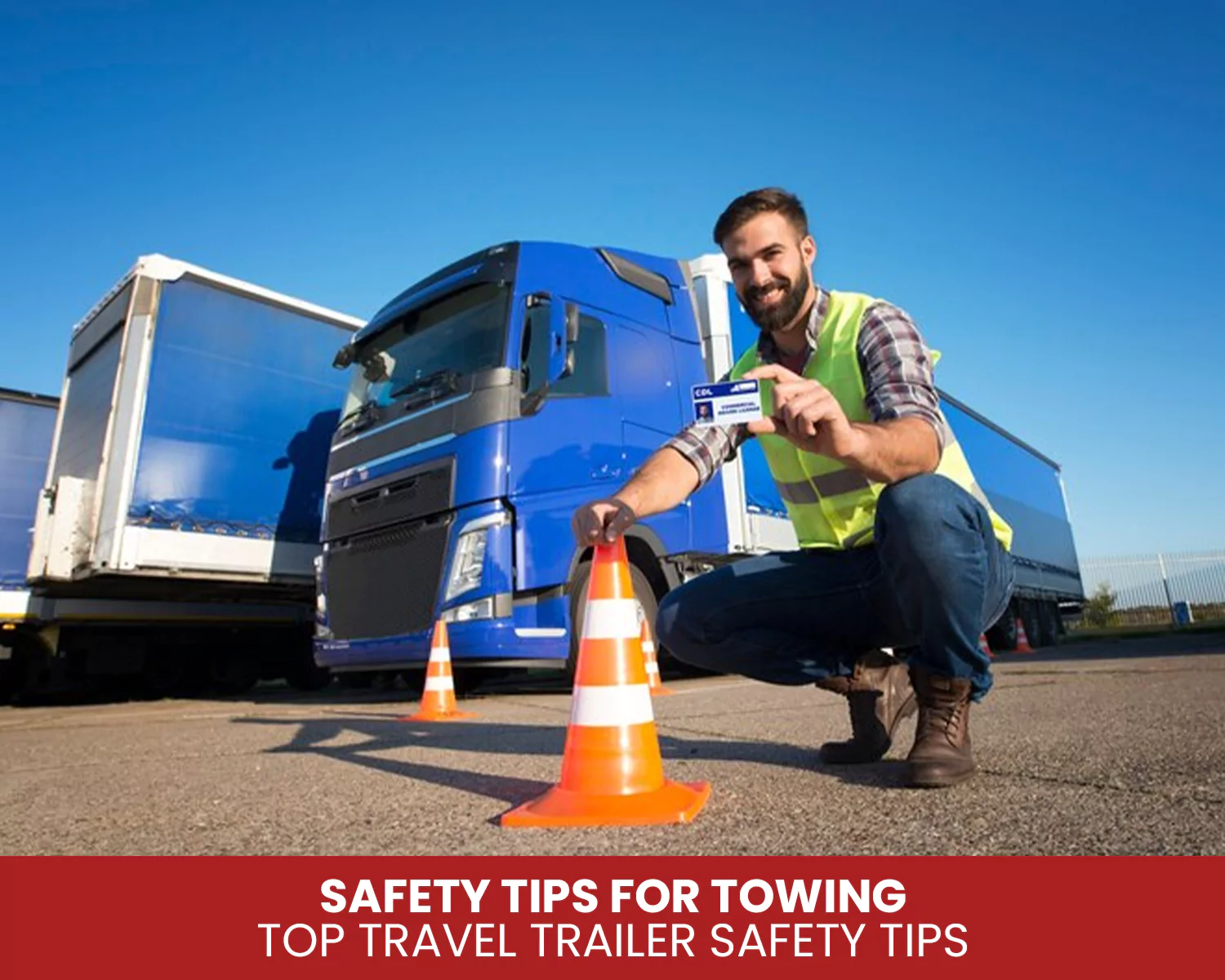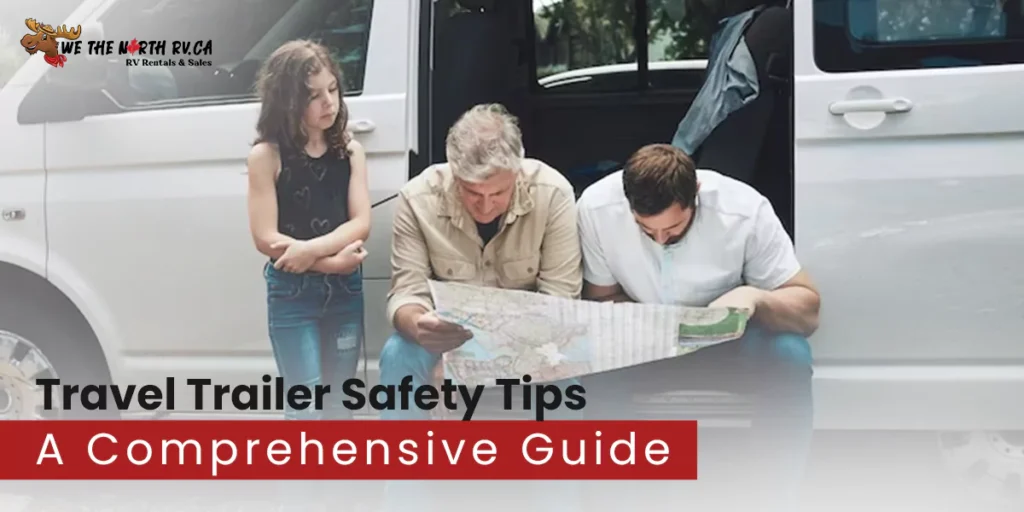Taking care of the travel trailer’s safety is important, guaranteeing a prolonged service life and making it a highly secure living space during your journeys. In the comfort of a travel trailer, these characteristics capture the charm and freedom an adventurous person feels when travelling. These mobile sanctuaries serve as temporary homes on the move, where adventurers can set out from pseudo-homes. Nevertheless, the secret to unleashing these expeditions entirely depends upon what steps you will take regarding the care and safety of your travel trailer.
Key Takeaways
- Preserve your travel trailer’s vibrance using UV protectant spray or wax to combat discoloration from the sun.
- Understanding vehicle limitations, proper trailer loading, tire maintenance, lighting visibility, brake system awareness, and mirror adjustments are crucial for safe towing and overall travel trailer safety.
- Prioritize adequate brakes, properly inflated and rated tires, crossed safety chains, and working lights for a secure towing experience.
- Choose shaded parking areas and maintain ventilation to prevent excessive heat buildup inside your travel trailer during scorching summer days.
Safety Tips for Towing: Top Travel Trailer Safety Tips
The following highlights the core travel trailer safety guidelines that would make your trips safe, enjoyable and unchallenged by any unknowns.
UV Protection for Exterior Longevity
Because of the relentless glare from the sun, even travel trailers rentals are prone to suffering discoloration on their surfaces. Using a UV protectant spray or wax now and then is integral in fighting this. This seemingly menial yet important step helps to maintain the original look of fibreglass, thus preserving your trailer’s vibrance long into the future.
Heat Management for Interior Comfort
During the scorching summer months, thoughtful consideration of where you park your travel trailer becomes crucial. Opting for shaded areas and implementing measures to maintain adequate ventilation prevents excessive heat buildup.
Controlling Humidity Levels
High humidity levels inside your trailer can lead to condensation, leading to mould growth because the moisture will condense in its tension, weakening the trailer’s structure. Opening windows and vents will frequently be necessary in addition to maintaining a secure, humidity-free environment to properly circulate air and dehumidify.
Holding Tank Maintenance
Ensure that a routine for emptying and cleaning the holding tanks in your travel trailer is set in place to maintain hygiene. Having reliable holding tank cleaners ensuring efficient cleaning and functioning is highly recommended to avoid foul smells and blockage during your voyages.
Rodent Prevention
All cracks and holes that could act as rodent invasion points should be sealed. It is proactive vulnerability management that ensures a vermin-free- environment. Investing in mouse or rat traps adds an extra layer of protection, preserving the sanctity of your trailer.
Fridge and Freezer Care
Cleaning the fridge and freezer regularly is necessary to retain the freshness of stored foods and prevent stale smells or deter undesirable occurrences like burns in case of freezing. Introducing a cleaning regime and using a fridge liner as a preventative process helps improve the hygiene of your trailer.
Septic Needs
Regular pumping and adding bacteria-killing enzymes are imperative for trailers with septic tanks to prevent overflow and maintain proper functionality. This preventative measure minimizes the risk of septic issues during your travels.
Battery Care
You should frequently check your trailer’s battery condition. The baking soda and water mixture stops corrosion by cleaning the battery terminals. Acquiring a high-quality, long-lasting battery charger guarantees that your batteries are constantly fully charged, guaranteeing the correct operation of all critical parts.
Fuel Tank Stabilizer
Using a fuel stabilizer before travelling long distances ensures that the petrol does not turn stale or is free from bacteria and other contaminants, likely leading to line clogs. This preventive measure helps to reduce the likelihood of facing fuel-related inconveniences while travelling, making your trip comfortable and pressure-free.
Security and Protection Measures
One should invest in a reliable security system for their travel trailer as it is very much recommended to enjoy peace of mind and protect one’s belongings. Your travel budget is further shielded from unfortunate events such as accidents or theft, even though the insurance coverage acts only one more layer of security.
Portable Equipment Maintenance
In addition, you must also know how to maintain and properly store portable generators, as well as other equipment. Regular maintenance ensures optimal performance, and secure storage prevents damage or theft, maximizing lifespan.
Ensuring Air Circulation
Ventilation is vital to your travel trailer air circulation so that mould and mildew do not develop. Regularly opening windows and vents provides an atmosphere where moulds and mildew cannot grow, making it more comfortable.
Exterior Cleaning
Nothing keeps the outside of your travel trailer spotless better than routine soaping down with a top-quality cleaner. This practice helps remove the accumulated dirt, grime and plants, helping your trailer live longer while enhancing its aesthetics.
Tire Care and Rotation
Wear, tread depth measurements, and cracks or bulges regularly inspecting the tire on your trailer are vitally crucial for stress-free travel. Regular rotation of tires ensures uniform wear and tear, prolonging the tire life. The purchase of high-quality tire covers helps shield the vehicle from harmful ultraviolet light and environmental conditions, increasing the tires’ service life.
Why Travel Trailer Safety Tips Are Important?
 The travel trailer safety tips play a crucial role because they maintain the well-being of people and their vehicles. Here are six compelling reasons why these safety measures are vital:
The travel trailer safety tips play a crucial role because they maintain the well-being of people and their vehicles. Here are six compelling reasons why these safety measures are vital:
Vehicle Limitations
It is not a mere recommendation; it practices the very essence of safety while towing. Either towing beyond the maximum allowed limit means unsafe handling, poor braking performance or, at times, cause severe damage to major components in a vehicle. Knowing the vehicle’s capacity and use of an appropriate hitch for a safe tow is essential.
Proper Trailer Loading
Proper loading is essential beyond staying within the trailer’s load capacity. The combination of a well-balanced tongue weight and a load distribution of 60% over the front half of the trailer results in increased steering stability. The safety of cargo is inhibited without the necessary securing that conveys that a shift in transit creates the potential for accidents or may involve loss.
Tire Maintenance
Do not forget to care for tires with severe driving implications. The poor performance of the underinflated tires in steering and maneuvering is attributed to their fuel consumption and proneness to tread rubber damage due to tire blowout likelihood. The safety trip involves regularly checking the tire pressures on the tow vehicle and trailer, following recommended inflation standards, and verifying spare tires.
Lighting Visibility
This should be balanced against the need for proper functioning lights on the tow vehicle or trailer. It is essential to check the operating condition of tail lights, marker lamps, turn signals and brake lights, which significantly affect visibility, especially at night. However, collisions can be avoided by ensuring that these lights are visible to other drivers, even if the trailer partially hides light from those of the vehicle.
Brake System Awareness
Smaller trailers may not require brakes, but larger or heavier trailers typically do. Understanding the weight threshold at which brakes are necessary is vital. The safety is further enhanced by the proper functioning of the trailer’s brake and the correct installation of an emergency break-away cable, especially when there is an eventual issue with disconnecting from sensors.
Mirror Adjustment
Clear vision is essential for both towing and regular driving and properly positioned mirrors significantly increase driving safety. Guaranteeing that side view mirrors provide a field of vision ending where the stage of the trailer starts will remove blind spots while improving overall situational awareness. Specialized towing mirrors, if available, can further optimize visibility.
How to Safely Pull a Travel Trailer?
You should know your trailer intimately, understanding its weight distribution and dimensions. Make wider turns when navigating curves and corners to maintain stability and avoid collisions. Account for the increased stopping distance when towing, allowing for controlled halts. Opt for the right highway lane for a smoother traffic flow and consistent speed. Regularly assess and adjust trailer brakes based on the load to ensure optimal performance. During long downhill descents, avoid continuously riding your truck’s brakes, using engine braking and downshifting strategically. When backing up, employ a spotter to guide you in overcoming limited visibility challenges. Lastly, improve your towing skills by practicing driving with your trailer in controlled environments, turning each journey into a confident and secure adventure.
What Trailer Safety Should You Have?
Ensuring travel trailer safety involves prioritizing essential components contributing to a secure towing experience. Adequate brakes are paramount, providing the means for controlled stops and stability. Regular inspection and maintenance of brakes are crucial to prevent issues during towing. Properly inflated and rated tires are equally vital, supporting the trailer’s weight and contributing to overall stability. Crossed safety chains act as a crucial backup, providing an additional layer of security in case of hitch failure. Working lights on the trailer are imperative for visibility and signalling intentions to other drivers on the road. Understanding and addressing these key trailer components are foundational to creating a safe towing environment.
Conclusion
Travel trailer safety tips are not just about following guidelines; it’s a commitment to safeguarding lives and property. These measures create a comprehensive safety net, ensuring that every journey is not only adventurous but secure and free from avoidable risks.




